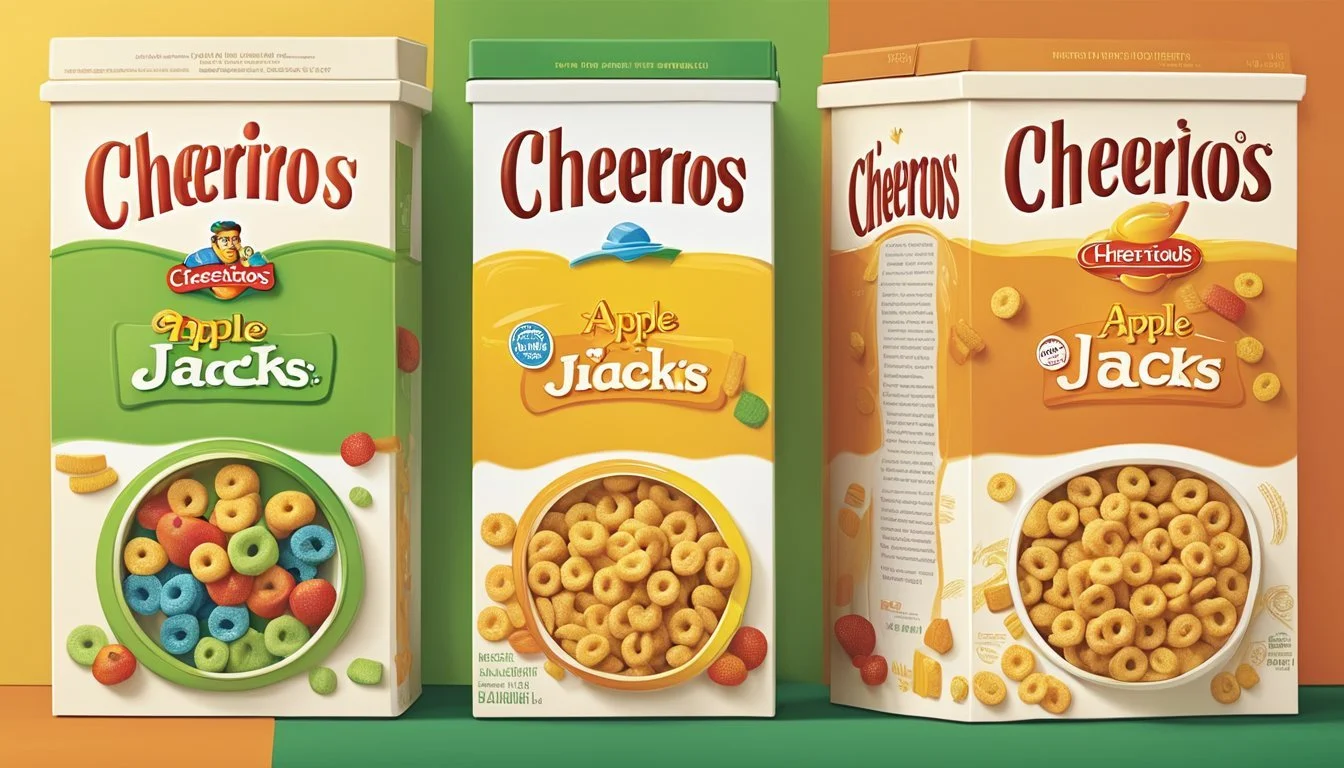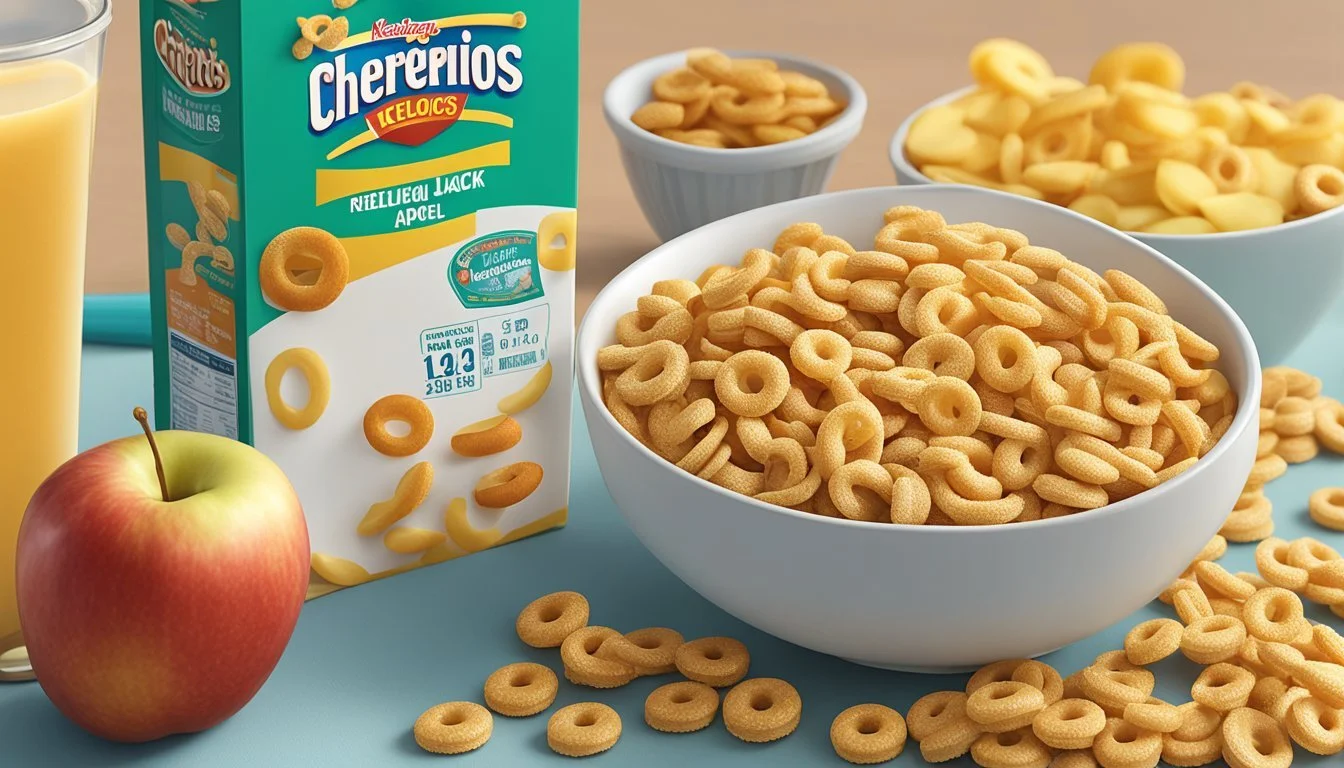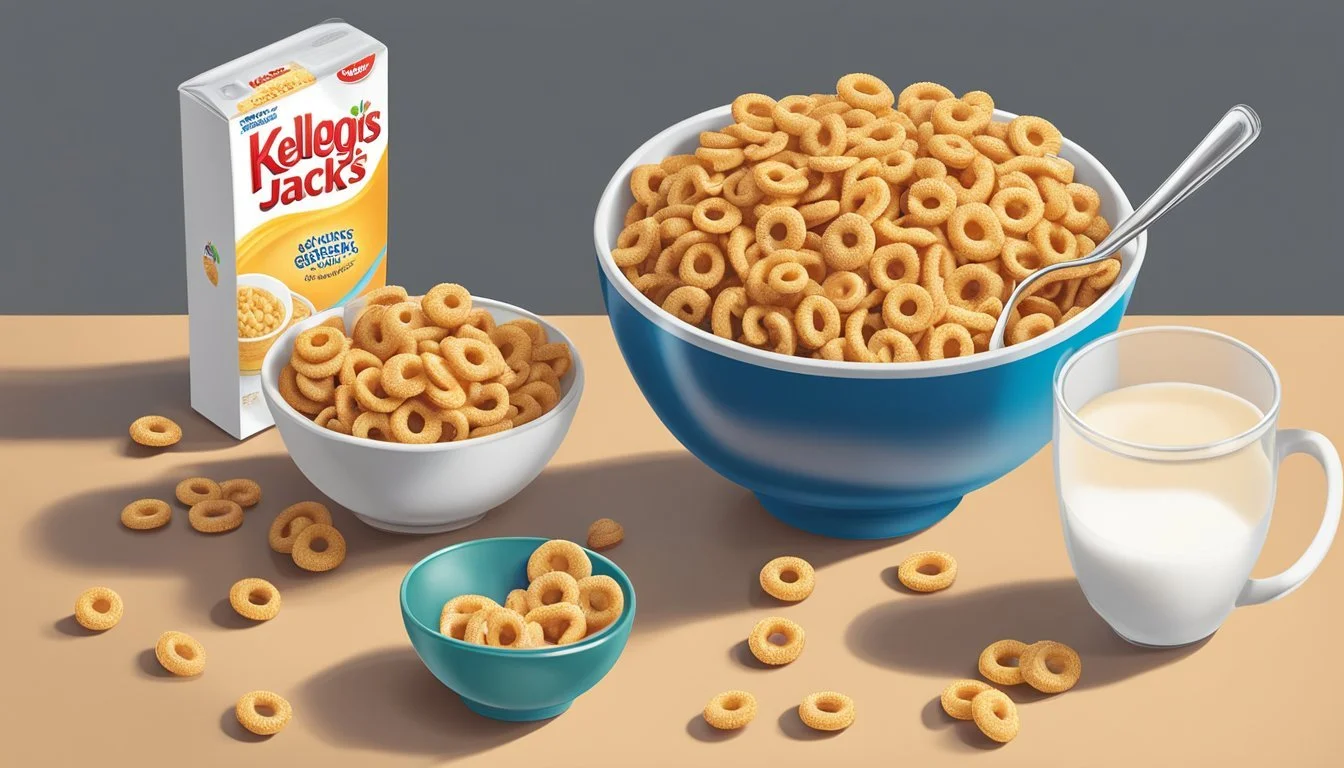Cheerios vs Kellogg's Apple Jacks
A Nutritional Comparison
This Article is Part of Our Breakfast Cereal Guide with Details on Cheerios Nutrition and Kellogg's Apple Jacks Nutrition
When choosing a breakfast cereal, many people find themselves torn between Cheerios and Kellogg's Apple Jacks. Cheerios, produced by General Mills, is widely praised for its nutritional benefits, boasting high levels of Iron, Manganese, Zinc, and various essential vitamins. On the other hand, Kellogg's Apple Jacks are recognized for their enjoyable taste and higher Vitamin B2 content.
In terms of complex carbohydrates, Cheerios provide 17.0 grams per serving, compared to 11.0 grams in Apple Jacks. This makes Cheerios a potentially better choice for those seeking sustained energy throughout the morning. Cheerios are also particularly richer in Iron, offering 213% higher daily need coverage than Apple Jacks.
However, some may prefer the flavor and texture of Apple Jacks, which have been a comforting breakfast staple since 1965. While both cereals have their own strengths, the choice ultimately depends on whether health benefits or taste preference is the primary concern.
Historical Background and Brand Evolution
Cheerios and Kellogg's Apple Jacks have rich histories marked by innovation and adaptation, making them staple breakfast choices across generations.
Origin of Cheerios
Cheerios, produced by General Mills, debuted in 1941 as "CheeriOats." The name was later changed to Cheerios in 1945. It was one of the first cereals to use puffing gun technology, which transformed oats into small, crispy O's.
The simple, wholesome ingredients made Cheerios an instant hit. Over the years, the brand has introduced various flavors and health-centric product lines, including Honey Nut Cheerios in 1979. Today, Cheerios is celebrated not only for its taste but also for its heart-health benefits, boasting whole grains and essential vitamins and minerals.
Kellogg's Apple Jacks Development
Kellogg's introduced Apple Jacks in 1965, originally created by an intern named William Thilly. The cereal featured a unique apple and cinnamon flavor, setting it apart from other Kellogg's products.
Apple Jacks quickly grew in popularity, with its distinctive orange and green O's becoming a breakfast table staple. Throughout its history, the brand has experimented with various shapes and limited-edition versions like bats and ghouls. Additionally, mascots and marketing campaigns have evolved to keep the brand appealing to new generations, ensuring its place in the competitive breakfast cereal market.
Nutritional Comparison
Cheerios and Kellogg's Apple Jacks differ significantly in their nutritional profiles, particularly in macronutrient composition and vitamin and mineral content. This section will cover macronutrients, calories, vitamins, minerals, sugar, and fiber content.
Macronutrients and Calories
Cheerios and Apple Jacks vary in macronutrient content and calorie count per serving.
Cheerios generally offer a healthier option. They provide more complex carbohydrates at 17 grams per serving compared to Apple Jacks' 11 grams. Cheerios also have around 100 calories, while Apple Jacks have 110 calories.
Nutrient Cheerios Apple Jacks Complex Carbs 17g 11g Calories 100 110 Protein 3g 2g Fat 2g 1g
Cheerios are higher in protein and fat, making them a more balanced choice for those looking to manage weight and improve overall nutrient intake.
Vitamins and Minerals Content
The vitamin and mineral content in these cereals is also distinct.
Cheerios are richer in essential nutrients like iron, covering 213% of the daily need. They also have higher levels of zinc, folate, phosphorus, Vitamin B6, Vitamin B12, Vitamin A RAE, and calcium. In comparison, Apple Jacks offer more Vitamin B2.
Vitamins/Minerals Cheerios Apple Jacks Iron High (213% daily need) Low Calcium Higher Lower Vitamin B2 Lower 15x More Vitamin B12 Higher Lower
Consumers needing iron and calcium will benefit more from choosing Cheerios.
Sugar and Fiber Analysis
Fiber and sugar content significantly impact the healthiness of breakfast cereals.
Cheerios have a more balanced fiber content and contain less sugar. They provide approximately 3 grams of fiber per serving and around 1 gram of sugars. Apple Jacks, on the other hand, are higher in sugar content, which can lead to an energy spike followed by a drop.
Nutrient Cheerios Apple Jacks Fiber 3g 1g Sugar 1g Higher
For those looking to lower their sugar intake and maintain blood sugar levels, Cheerios are the preferable option.
Product Varieties and Flavors
Cheerios and Kellogg's Apple Jacks both offer a variety of flavors that cater to different taste preferences. Each brand distinguishes itself with unique flavor profiles and product variations.
Variations of Cheerios
Cheerios come in multiple flavors designed to appeal to a wide audience. Honey Nut Cheerios provide a sweet and nutty flavor, while Apple Cinnamon Cheerios offer a blend of apple and cinnamon taste. Fruity Cheerios cater to those who prefer a mixed fruit flavor, and Chocolate Cheerios satisfy chocolate lovers.
Cheerios also offer variations for different dietary needs, including Multi-Grain Cheerios and Gluten-Free Cheerios. This breadth of options ensures there is something for everyone, whether they seek a sweet taste or a healthier choice.
Flavor Profile of Apple Jacks
Kellogg's Apple Jacks are known for their distinctive apple and cinnamon flavors. The cereal combines sweet apple tones with warm cinnamon, making it a favorite among those who enjoy flavored cereals. Apple Jacks sticks to its classic taste, differentiating it from other cereals that often have multiple variations.
The consistent flavor profile of Apple Jacks appeals to those who specifically seek out the apple and cinnamon combination. With its crunchy texture and balanced sweetness, it stands apart in the market as a unique breakfast option.
Health and Diet Considerations
Kellogg's Apple Jacks and General Mills Cheerios offer different benefits and drawbacks for various health and diet considerations. Their impacts on heart health, contribution to a balanced diet, and potential allergens and restrictions are pivotal points of assessment.
Whole Grains and Heart Health
Cheerios are renowned for their heart-healthy benefits as they are made from whole grains and contain a significant amount of fiber. Whole grains help reduce the risk of heart disease by lowering cholesterol levels. Additionally, Cheerios provide a source of ALA omega-3, which is known for its cardiovascular benefits. Being low in fats, they align well with diets aimed at promoting heart health.
Apple Jacks, although not entirely devoid of nutritional value, are less focused on heart health. They do not emphasize whole grains in their ingredients, resulting in lower fiber content compared to Cheerios. Their formulation includes more sugars and refined grains, which do not contribute positively to heart health in the same way whole grains do. Consumers focused on heart health may find Cheerios to be the better option.
Low Diet Contributions
When reviewing their contributions to low-fat, low-carb, and low-calorie diets, both cereals have distinct profiles. Cheerios contain 17 grams of complex carbohydrates per serving, making them suitable for sustained energy release without spiking blood sugar levels. They are also lower in sugars and fats, aiding those who follow a low-fat or low-calorie regime. Cheerios' low glycemic index supports stable blood glucose levels, beneficial for people managing diabetes or on low-carb diets.
In contrast, Apple Jacks contain 11 grams of complex carbohydrates per serving but higher sugar content. They are less optimal for those on low-sugar or low-carb diets. While they are not excessively high in fats, their overall nutrient composition makes them less ideal for specific restrictive diets focused on managing weight or blood sugar levels.
Allergens and Dietary Restrictions
Cheerios are generally a safer option for individuals with common dietary restrictions. They do not contain nuts, making them suitable for individuals with nut allergies. They are also often gluten-free, beneficial for those with celiac disease or gluten sensitivity. Additionally, Cheerios usually avoid dairy products, supporting lactose-intolerant individuals.
Apple Jacks, while also avoiding nuts and likely being gluten-free due to their corn-based ingredients, have artificial colors and flavors. These additions can be problematic for those with sensitivities or seeking more natural food options. Both cereals typically do not contain dairy, making them accessible to lactose-intolerant individuals, but checking ingredient lists is always advised to verify safety based on specific dietary needs.
Consumer Experience
Consumers often consider texture, crunchiness, and brand mascots when choosing between cereals like Cheerios and Apple Jacks. These factors shape the overall enjoyment and familiarity of the cereal-eating experience.
Texture and Crunchiness
Cheerios and Apple Jacks both offer a distinctive crunch, which is a key aspect of their appeal.
Cheerios tends to have a slightly firmer texture, which many consumers appreciate for its ability to stay crunchy in milk longer. This feature makes Cheerios popular among those who prefer their cereal to maintain its crispness throughout their meal.
Apple Jacks, meanwhile, is known for a lighter, airy crunch. Although it can become softer more quickly in milk, this can be appealing to those who enjoy an initial crispness followed by a more tender consistency. The different textures and crunch levels cater to a variety of preferences, ensuring both cereals maintain a loyal consumer base.
Brand Mascots and Marketing
The mascots and marketing strategies of Cheerios and Apple Jacks contribute significantly to their consumer experiences.
Cheerios has utilized various mascots over the years, but none are as iconic as the Cheerios honey bee, BuzzBee. This friendly character effectively communicates the brand's association with heart health and wholesome ingredients, appealing to families and health-conscious consumers.
Apple Jacks features the playful dynamic duo of CinnaMon and Bad Apple. Their adventures and banter in commercials captivate a younger audience, making breakfast more entertaining for children. The focus on fun and flavor differentiates Apple Jacks from other options like Honey Smacks and Golden Crisp, which have mascots but may not invest as heavily in storytelling.
Both brands use their mascots to create a strong emotional connection with their audiences, enhancing the overall consumer experience.
Market Presence and Pricing
General Mills' Cheerios and Kellogg's Apple Jacks have both established themselves prominently in the breakfast cereal market. Each brand holds significant market share and exhibits distinct pricing strategies.
Comparative Market Share
General Mills' Cheerios command a robust presence in the cereal market, often favored for their health benefits and a wide variety of flavors. On the other hand, Kellogg's Apple Jacks attract consumers with their unique apple and cinnamon flavor combination, appealing particularly to children.
General Mills (Cheerios):
Strong market presence
Valued for nutritional benefits
Multiple product variations
Kellogg (Apple Jacks):
Popular among younger demographics
Distinct flavor profile
Focused marketing towards kids
Price Considerations
Pricing can influence consumer choices between Cheerios and Apple Jacks. The average unit price for Kellogg's Apple Jacks is approximately $3.47. Various factors affect pricing, such as production costs, marketing expenditures, and regional demand.
Key Points:
Cheerios: Slightly more expensive due to added nutrients and marketing as a healthy option.
Apple Jacks: Priced competitively to attract children and budget-conscious families.
Both brands often feature in promotions and discounts, which can affect their shelf price, making them accessible to a broader audience.
| Cereal | Average Unit Price |
|--------------|--------------------|
| Apple Jacks | $3.47 |Environmental and Ethical Factors
Examining the environmental and ethical dimensions of Cheerios and Kellogg's Apple Jacks highlights both companies' approaches to ingredient sourcing and corporate responsibility.
Sourcing of Ingredients
Cheerios prides itself on sustainability, especially with its oats. General Mills emphasizes responsible sourcing, aiming to reduce water use and support biodiversity. Cheerios' oats are often grown with minimal pesticides, improving soil health and local ecosystems.
Apple Jacks, from Kellogg's, also focuses on sustainability but faces challenges with sugar cane and corn ingredient sourcing. Efforts are being made to obtain these ingredients from farms implementing sustainable practices. Transparency in ingredient sourcing is crucial, impacting both product quality and consumer trust.
Corporate Responsibility
General Mills, the producer of Cheerios, has committed to reducing its greenhouse gas emissions and improving agricultural sustainability. They have set ambitious environmental targets, partnering with various organizations to promote sustainable farming and reduce their carbon footprint.
Kellogg's has similar corporate goals, aiming to ensure ethical practices throughout their supply chain. They actively invest in community programs and strive to reduce waste and energy usage. Initiatives like supporting smallholder farmers and improving workers' conditions reflect their broader commitment to corporate responsibility.
More on Cheerios
More on Kellogg's Apple Jacks
Cinnamon Toast Crunch vs Kellogg's Apple Jacks: Which is better?
French Toast Crunch vs Kellogg's Apple Jacks: Which is better?
Honey Nut Cheerios vs Kellogg's Apple Jacks: Which is better?
Kellogg's Apple Jacks vs Kellogg's Froot Loops: Which is better?
Kellogg's Apple Jacks vs Post GrapevsNut Flakes: Which is better?
Kellogg's Apple Jacks vs Post Raisin Bran Cereal: Which is better?








